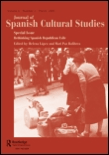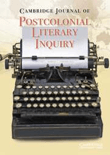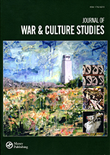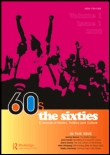
Journal of Spanish Cultural Studies
Scope & Guideline
Unveiling the Rich Tapestry of Spanish Heritage
Introduction
Aims and Scopes
- Interdisciplinary Approaches:
The journal encourages research that employs various methodologies, blending literary analysis, cultural studies, history, and social theory to provide comprehensive insights into the cultural phenomena of the Spanish-speaking world. - Focus on Historical Contexts:
Many articles delve into historical themes, particularly the impact of Spain's colonial past, the Civil War, and the Franco regime, exploring how these events shape contemporary cultural narratives and identities. - Exploration of Gender and Identity:
A consistent focus on gender studies, particularly the roles and representations of women and LGBTQ+ identities in literature, film, and art, reflects the journal's commitment to addressing issues of marginalization and social justice. - Cultural Memory and Trauma:
The journal frequently discusses the themes of memory, trauma, and the legacies of conflict, particularly in relation to the Spanish Civil War and its aftermath, highlighting how these histories influence current cultural expressions. - Contemporary Cultural Critique:
Current cultural critiques, especially in relation to neoliberalism, globalization, and postcolonialism, are prevalent, indicating the journal's engagement with pressing sociopolitical issues in modern Spain. - Artistic Innovations and New Media:
There is a notable emphasis on the intersection of art, technology, and politics, with discussions on how new media and artistic practices respond to and reflect societal changes.
Trending and Emerging
- Digital Humanities and New Media:
There is a growing interest in the digital humanities, with research exploring how technology influences cultural production and representation, including studies on social media's impact on identity and activism. - Postcolonial and Decolonial Studies:
Emerging themes in postcolonial and decolonial studies reflect a critical engagement with Spain's colonial past, examining its legacies in contemporary cultural expressions and identities. - Intersectionality in Cultural Studies:
An increasing focus on intersectionality highlights the interconnectedness of race, gender, class, and sexuality in shaping cultural narratives, emphasizing the complexities of identity in modern Spain. - Environmental and Ecological Critique:
Recent articles show a rising concern with environmental issues and ecological criticism, linking cultural narratives to broader discussions about sustainability and climate change. - Transnational and Diasporic Narratives:
There is a notable trend toward exploring transnational identities and diasporic experiences, reflecting Spain's multicultural society and the global movement of people and ideas.
Declining or Waning
- Traditional Literary Canon:
There is a noticeable decline in articles focusing on the traditional literary canon, such as classic texts from the Golden Age, as newer, more diverse voices and narratives gain prominence in cultural studies. - Static Historical Narratives:
Research that presents static or uncritical historical narratives, particularly those glorifying past regimes or colonialism, is becoming less common as scholars increasingly prioritize nuanced and critical examinations of history. - Eurocentric Perspectives:
The journal's shift towards more global and inclusive perspectives has led to a waning of strictly Eurocentric analyses, as researchers focus on transnational and multicultural contexts. - Conventional Gender Roles:
There is a decline in the exploration of conventional gender roles in literature and film, as the discourse increasingly emphasizes intersectionality and the complexities of identity. - Focus on National Identity:
As Spain's cultural landscape diversifies, discussions centered solely on national identity are becoming less frequent, giving way to more explorations of regional identities and diasporic experiences.
Similar Journals

Aportes-Revista de Historia Contemporanea
Pioneering Research for Today’s Historical ConversationsAportes-Revista de Historia Contemporanea is a distinguished academic journal focusing on contemporary historical studies, published by SCHEDAS S L and the Fundación Ignacio Larramendi in Spain. With an ISSN of 0213-5868 and an E-ISSN of 2386-4850, this journal aims to disseminate innovative research and diverse perspectives in the field of modern history. Recognized in the Q2 category in History for 2023, it ranks in the 38th percentile among its peers, showcasing its commitment to quality scholarship. Aportes seeks to bolster academic dialogue and promote understanding among researchers, professionals, and students interested in the nuances of historical narratives from 2017 to 2024. While not currently an open-access journal, it provides significant insights that contribute to ongoing debates in historical discourse, making it an essential resource for anyone engaged in the study of contemporary history.

ZEITGESCHICHTE
Exploring the Intersections of History and CultureZEITGESCHICHTE, published by VANDENHOECK & RUPRECHT GMBH & CO KG, is a leading academic journal in the fields of Cultural Studies and History, distinguished by its Q2 ranking within the respective categories as of 2023. Based in Austria and serving a global audience, ZEITGESCHICHTE encompasses a broad range of interdisciplinary scholarly articles that examine historical context and cultural dynamics from various perspectives, contributing to a deeper understanding of contemporary issues rooted in the past. With a publication history dating back to 1976, the journal has evolved significantly, currently offering vital insights from 2006 to 2023, although it is not an open-access platform, ensuring that each piece maintains rigorous peer-review standards. This esteemed journal serves as an essential resource for researchers, students, and professionals seeking to navigate the intricate intersections of history and culture, reinforcing its importance in academic discourse.

Cambridge Journal of Postcolonial Literary Inquiry
Advancing scholarship in postcolonial literary discourse.Welcome to the Cambridge Journal of Postcolonial Literary Inquiry, a leading academic journal published by Cambridge University Press, dedicated to exploring the intricate intersections of postcolonial studies, literature, and history. With its ISSN 2052-2614 and E-ISSN 2052-2622, this journal has emerged as a vital resource for researchers, professionals, and students interested in the evolving narratives and theoretical frameworks shaped by postcolonial contexts. Operating since 2014 and spanning until 2024, it holds a commendable position in the academic community, reflected in its Scopus rankings, including a 76th percentile in Literature and Literary Theory. While the journal does not provide open access options at this time, it offers comprehensive insights that contribute significantly to the discourse surrounding cultural studies and historical perspectives. With categories in the Q3 and Q2 quartiles for Cultural Studies and Literature, it remains a crucial space for innovative scholarship, fostering intellectual engagement with the themes of identity, power, and resistance represented in postcolonial literature.

Journal of War & Culture Studies
Fostering Critical Discourse on Warfare and SocietyThe Journal of War & Culture Studies, published by Routledge Journals, Taylor & Francis Ltd, stands as a pivotal platform for interdisciplinary scholarship that examines the complex interrelations between warfare and cultural dynamics. With an ISSN of 1752-6272 and E-ISSN of 1752-6280, this esteemed journal has gained recognition in various effective academic rankings, securing a Q2 position in Anthropology, Q1 in History, and Q3 in Political Science and International Relations, reflecting its significant contribution to these fields. The journal's Scopus rankings further reinforce its scholarly impact, particularly its standout position in the top percentile for history research. Covering a diverse array of topics from the cultural legacies of warfare to contemporary geopolitical narratives, the journal seeks to foster critical discourse and provide researchers, professionals, and students with insights that bridge history, culture, and conflict studies. Available annually from 2013 to 2024, the journal not only offers a rich repository of knowledge but also invites submissions that challenge existing paradigms and engage with new theoretical frameworks in the study of war and culture.

Anclajes
Cultivating Knowledge Across Borders and DisciplinesAnclajes is a prominent academic journal dedicated to the fields of Cultural Studies, Linguistics, and Literature, published by the UNIV NACIONAL LA PAMPA, FAC CIENCIAS HUMANAS. With both print (ISSN 0329-3807) and electronic (E-ISSN 1851-4669) formats, the journal has embraced an Open Access model since 2010, greatly enhancing its accessibility and reach to a global audience. Based in Argentina, Anclajes provides a platform for innovative research and critical discourse, contributing significantly to the understanding of cultural phenomena and literary theories. In recent years, the journal has established itself with a Scopus rank placing it in the top 30% of Literature and Literary Theory and the top 57% of Cultural Studies, as indicated by its quartile rankings for 2023. With issues converging from 2012 to 2024, Anclajes continues to foster scholarly communication and serves as an essential resource for researchers, students, and professionals seeking to explore the dynamism of human culture and expression.

ART HISTORY
Unveiling the Complexities of Visual and Performing ArtsART HISTORY is a prestigious journal published by Wiley, focusing on the dynamic and diverse field of visual arts and performing arts since its inception in 1978. With an ISSN of 0141-6790 and an E-ISSN of 1467-8365, the journal has established itself as a significant resource for researchers, professionals, and students interested in exploring the complexities of art across various epochs and cultures. Currently ranked in the Q3 category within the Visual Arts and Performing Arts sector and positioned at #132 out of 667 in Scopus rankings—representing the top 80th percentile—ART HISTORY delivers insightful scholarship that contributes to the understanding and appreciation of art history. Although it does not offer open access, the journal remains committed to publishing high-quality, peer-reviewed articles that delve into critical artistic practices, theories, and aesthetics. The journal's location in the United Kingdom further enhances its international reach and influence, making it a vital platform for advancing discourse in the arts.

Sixties-A Journal of History Politics and Culture
Navigating the Complexities of 1960s History and CultureSixties - A Journal of History, Politics and Culture is an academic journal dedicated to exploring the multifaceted dimensions of the 1960s, an era that profoundly influenced contemporary society and culture. Published by Routledge Journals, Taylor & Francis Ltd, this journal aims to provide a platform for rigorous scholarship in fields including cultural studies, history, sociology, and political science. With the ISSN 1754-1328 and an E-ISSN of 1754-1336, the journal has a history of publication from 2008 to 2022 and has been situated in Q4 quartiles across major academic categories, reflecting its niche yet significant presence in the academic community. While the H-index is unavailable, its Scopus rankings indicate a recognition in the arts and humanities, with particular emphasis on history and cultural studies—ranking 1606 out of 1760 in History and 1213 out of 1304 in Cultural Studies. The journal's impact lies in its ability to foster critical discourse and provide insights into the socio-political dynamics of the sixties, making it an essential read for researchers, professionals, and students interested in understanding the enduring legacy of this pivotal decade.

Historia y Politica
Bridging the Gap Between Historical Events and Political ContextsHistoria y Política is a prestigious academic journal published by the CENTRO ESTUDIOS POLITICOS CONSTITUCIONALES in Spain, recognized for its in-depth exploration of historical and political dynamics. With an ISSN of 1575-0361 and E-ISSN 1989-063X, this journal holds a significant place in the academic community, categorizing itself within Q2 in History and Q3 in Sociology and Political Science as of 2023. Spanning published works from 1999 to 2024, it focuses on a diverse array of subjects related to historical phenomena and their political implications, appealing to researchers, professionals, and students seeking to understand the intricate connections between past events and contemporary political landscapes. The journal does not currently offer open access; however, its rigorous peer-review process ensures that each publication meets high scholarly standards. With Scopus ranking it in the 74th percentile for History and 32nd percentile for Sociology and Political Science, Historia y Política continues to contribute valuable insights and foster critical discussions in its fields of expertise.

CELEHIS-Revista del Centro de Letras Hispanoamericanas
Celebrating Diverse Voices in Hispanic LiteratureCELEHIS-Revista del Centro de Letras Hispanoamericanas is an esteemed academic journal dedicated to the exploration and dissemination of research in the field of Hispanic literature and cultural studies. Published by the UNIV NAC DE MAR DEL PLATA-CENTRO LETRAS HISPANOAMERICANAS, this journal has embraced open access since 2014, making its rich repository of scholarly articles available to a global audience. The journal aims to foster knowledge and dialogue surrounding the diverse literary expressions of Hispano-American cultures, providing insights that are crucial for researchers, professionals, and students alike. With its commitment to scholarly excellence, CELEHIS plays a significant role in enhancing the understanding and appreciation of Latino literature, while encouraging interdisciplinary collaboration and critical discourse within the academic community. Located in Mar del Plata, Buenos Aires, Argentina, it stands as a crucial platform for voices in the field, facilitating a deeper engagement with the literary heritage of the Spanish-speaking world.

Architecture and Culture
Advancing Interdisciplinary Insights in Built EnvironmentsArchitecture and Culture is an esteemed journal published by Routledge Journals, Taylor & Francis Ltd, focusing on the intersection of architecture, cultural studies, urbanism, and the visual and performing arts. Since its inception, this journal has become a vital platform for researchers, professionals, and students to explore the multifaceted relationship between architecture and cultural identity within contemporary contexts. With an ISSN of 2050-7828 and an E-ISSN of 2050-7836, the journal reaches a global audience from its base in the United Kingdom. Featuring a commendable Q2 ranking in Visual Arts and Performing Arts and a consistent presence in multiple relevant quartiles, including Q3 in both Architecture and Cultural Studies, it is well-regarded for its scholarly impact. The journal offers a unique opportunity for interdisciplinary dialogue, fostering innovative research that examines how built environments shape and are shaped by cultural narratives. This commitment to advancing knowledge in these fields is reflected in its ongoing publication from 2014 to 2024, making it a pivotal resource for those at the forefront of the discourse on architecture and culture.